Online coaching has become a dynamic and highly sought-after field. Whether you’re an experienced coach or a passionate expert in your niche, taking your coaching services online can open up a world of opportunities. However, building an effective online coaching platform requires the right tools and resources. That’s where the LMS WordPress Theme by WP Elemento comes into play.
An LMS (Learning Management System) WordPress theme is the perfect solution for coaches and educators looking to offer courses, webinars, and coaching sessions to a global audience. It provides a user-friendly interface, robust features, and a professional design to help you deliver your coaching services effectively.
Throughout this blog, we will explore the process of creating an Online Coaching Website and the key features of the LMS WordPress Theme, including its intuitive course creation capabilities, membership options, and interactive tools that engage your students and clients. We’ll also guide you on how to personalize your website’s look and feel to reflect your brand and expertise.
Whether you’re a life coach, fitness trainer, business mentor, or any other type of coach, this blog series is your roadmap to success in the online coaching world. So, if you’re ready to embark on the journey of building your own online coaching platform, stay with us as we unlock the full potential of the LMS WordPress Theme by WP Elemento and help you reach a broader audience with your coaching expertise.
Why Does Coaching Need An LMS Website?
Coaching, whether it’s in the fields of personal development, business, health, or any other niche, plays a vital role in helping individuals achieve their goals and unlock their full potential. In today’s digital age, where online learning and remote coaching have gained significant traction, having a Learning Management System (LMS) website is becoming increasingly essential for coaching practitioners. Here’s a detailed look at why coaching needs an LMS website:
- Centralized Content Management: An LMS website serves as a centralized hub for storing and organizing coaching materials. Coaches can upload various resources, including video tutorials, e-books, quizzes, and assignments. This not only simplifies content management but also ensures that clients have easy access to all the necessary materials in one place.
- Seamless Course Delivery: LMS websites offer a structured and systematic way to deliver coaching services. Coaches can create and organize courses or coaching programs, making it easier for clients to follow a structured learning path. This enhances the overall coaching experience and helps clients track their progress.
- Enhanced Interactivity: LMS platforms come equipped with interactive features like discussion forums, live chat, and messaging systems. These tools facilitate real-time interaction between coaches and clients, allowing for questions, clarifications, and discussions, thus fostering a sense of community and engagement.
- Scalability: Online coaching often involves reaching a broad and diverse audience. An LMS website can scale to accommodate the growing number of clients and courses. Coaches can expand their coaching practice without the limitations of physical location or time constraints.
- Personalization: LMS platforms enable coaches to offer personalized coaching experiences. They can tailor content, assignments, and feedback based on individual client needs and goals. This level of customization enhances the value of coaching by addressing specific challenges and aspirations.
- Tracking and Analytics: LMS websites provide detailed analytics and reporting tools. Coaches can monitor client progress, track engagement with course materials, and gather valuable data to assess the effectiveness of their coaching programs. It is possible to continuously improve using this data-driven approach.
- Automation: LMS platforms streamline administrative tasks. Coaches can automate processes such as enrollment, payment processing, and certificate issuance. This automation saves time and ensures a smooth client onboarding experience.
- Accessibility: With an LMS website, coaching services become accessible 24/7 from anywhere in the world. Clients can access course materials and coaching sessions at their convenience, accommodating different time zones and busy schedules.
- Security and Privacy: LMS platforms prioritize data security and privacy. They offer features like user authentication, encryption, and secure payment processing, ensuring that client information remains confidential and protected.
- Branding and Professionalism: An LMS website can be customized to reflect the coach’s brand and professionalism. It provides a platform for coaches to showcase their expertise and establish themselves as authorities in their respective fields.
Overall, coaching benefits significantly from having an LMS website as it streamlines content management, enhances the coaching experience, fosters engagement, and enables coaches to scale their practice. This digital transformation aligns coaching with the evolving needs and expectations of clients in today’s digital era, ultimately contributing to the success and growth of coaching businesses.
The Role Of LMS WordPress Theme In Creating Online Coaching Website
The LMS (Learning Management System) WordPress Theme by WP Elemento plays a pivotal role in simplifying the process of creating a robust and engaging online coaching website. It’s a specialized theme designed to cater to the unique needs of coaches, educators, and trainers who want to offer courses and coaching services online. Let’s delve into its key features and how it streamlines the process of building an online coaching platform.
- Built on Elementor Page Builder: One of the standout features of the LMS WordPress Theme is its integration with the Elementor pro Page Builder plugin. This drag-and-drop page builder empowers users to create and customize their websites with ease, even if they have little to no coding experience. It provides a user-friendly interface for designing web pages, making it incredibly versatile and adaptable.
- Optimized for Tutor LMS Plugin: The theme is optimized to work seamlessly with the Tutor LMS plugin. It is the best LMS plugin for wordpress and is a powerful learning management system that allows for easy course creation, student and tutor login and dashboard management, and comprehensive e-learning functionalities. With this integration, you gain access to a wide array of features that facilitate effective coaching and course delivery.
- Responsive Design: It is no longer a choice between a responsive design and a mobile-friendly design in today’s mobile-centric world. The LMS WordPress Theme ensures that your online coaching website looks and functions flawlessly across various devices, including desktops, tablets, and smartphones. This guarantees a consistent and enjoyable user experience for your students and clients, regardless of how they access your content.
- Mega Menu: The inclusion of a mega menu feature enhances the navigation experience on your website. Mega menus allow you to organize and present a large amount of content in an organized and user-friendly manner. This is particularly useful when you have multiple courses, coaching programs, or resources to showcase.
- One-Click Demo Importer: Creating a website that reflects your vision and brand can be time-consuming. The LMS WordPress Theme streamlines this process with its one-click demo importer. It enables you to import pre-designed templates and layouts that can serve as a starting point for your coaching website. You can then customize these templates to align with your specific coaching style and branding.
Overall, the LMS WordPress Theme by WP Elemento is a powerful and user-friendly tool for creating a feature-rich online coaching website. It harnesses the capabilities of Elementor Page Builder and seamlessly integrates with the Tutor LMS plugin to provide a comprehensive coaching platform. Its responsive design ensures accessibility across devices, while the mega menu and one-click demo importer enhance navigation and design customization. With this theme, coaches can easily bring their expertise online, share their knowledge, and engage with a global audience effectively.
Steps To Create An Online Coaching Website With An LMS WordPress Theme
Creating an online coaching website with the LMS WordPress Theme by WP Elemento involves several essential steps. Let’s break down each step in detail to help you get started on your journey:
Step 1: Purchase Domain And Hosting
Creating an online coaching website is an exciting journey, and the first step in this process is crucial i.e. purchasing a domain and selecting a hosting provider. After careful planning, you can begin by selecting and registering a domain name that reflects your coaching brand. This domain name should be memorable, relevant, and easy to spell, ensuring it leaves a lasting impression on your potential clients or students.
Once you’ve chosen the perfect domain, the next step is to choose a reliable hosting provider. Hosting is like renting space on the internet to store your website’s files and make them accessible to users worldwide. It’s imperative to select a hosting provider known for its reliability, security, and customer support. Different hosting plans offer various features and performance levels, so assess your website’s needs to choose the most suitable plan.
Investing time and thought into the domain and hosting selection process lays a strong foundation for your online coaching website. Your domain becomes your digital address, while your hosting provider ensures your website is always available and responsive. These choices influence the user experience and play a significant role in your website’s overall success.
Step 2: Install WordPress
Once you’ve secured your hosting and domain, the next crucial step in creating your online coaching website is to install WordPress. WordPress is a widely acclaimed content management system (CMS) known for its user-friendliness and extensive customization options. Fortunately, the installation process is relatively straightforward, and most hosting providers offer a simple one-click installation process for WordPress.
To install WordPress, log in to your hosting account’s control panel (usually cPanel) and navigate to the section labeled “Auto Installers” or “One-Click Install.” From there, you can select WordPress as your preferred CMS and specify the domain where you want to install it. Click the “Install” button, and the hosting provider will handle the rest, creating the necessary database and configuring WordPress for you.
Once the installation is complete, you’ll receive login credentials for your WordPress dashboard, which is the control center for your website. Here, you can start customizing your coaching website, choosing themes, adding plugins, and creating content. WordPress’s user-friendly interface empowers you to build and manage your site without the need for extensive technical knowledge, making it an excellent choice for coaches looking to establish their online presence effectively.
Step 3: Purchase LMS WordPress Theme By WP Elemento
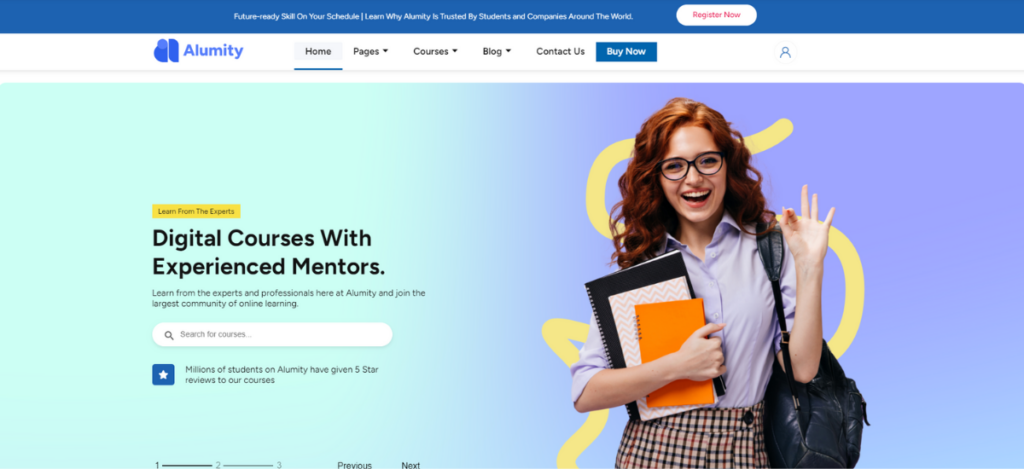
After successfully installing WordPress, the next crucial step in creating your online coaching website is to purchase the LMS WordPress Theme by WP Elemento. This theme is an integral component of your website-building process and serves as the bedrock upon which you’ll construct your coaching platform.
You can find this theme on the WP Elemento website at LMS WordPress Theme. It’s available for an affordable price of just $59, making it an excellent investment for anyone looking to establish a professional online coaching presence.
The LMS WordPress Theme by WP Elemento offers a range of features and functionalities tailored to the needs of online educators and coaches. It provides a user-friendly interface, customizable design options, and seamless integration with essential plugins like Elementor and Tutor LMS. With this theme, you can create a visually appealing and highly functional coaching website that not only attracts your target audience but also facilitates effective communication and course delivery.
As an added bonus, you can take advantage of a 25% discount during a sale, making the LMS WordPress Theme by WP Elemento an even more cost-effective choice. By purchasing this theme, you’re taking a significant step towards building a successful online coaching website that will engage your students and clients effectively.
Step 4: Upload LMS WordPress Theme
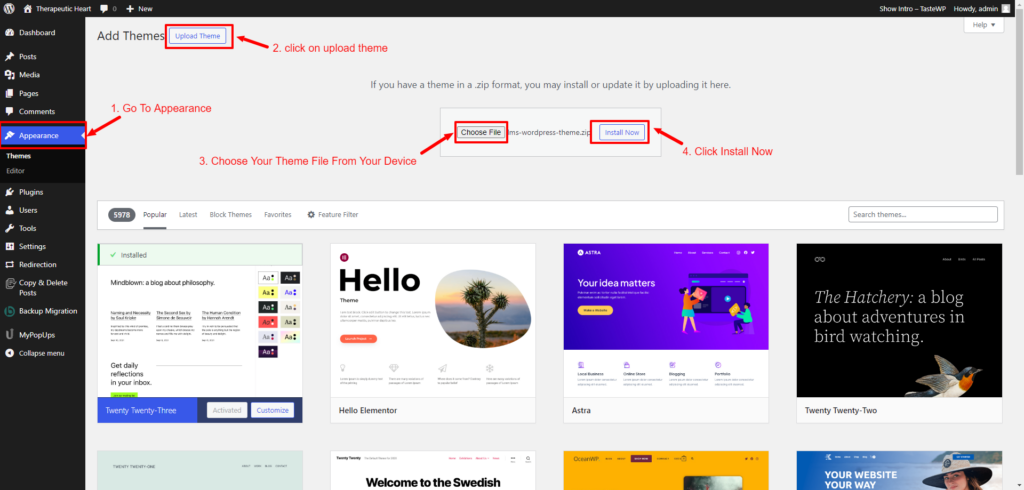
Once you have purchased the LMS WordPress theme, the next crucial step in creating your online coaching website is to upload the theme to your WordPress platform. This step lays the foundation for the visual and functional elements of your site, so it’s essential to understand how to do it effectively.
There are two primary methods to upload the LMS WordPress Theme to your website. The first method involves installing it directly via the WordPress admin panel. To do this, navigate to your WordPress dashboard, go to “Appearance,” and click on “Themes.” Then, click on the “Add New” button at the top of the page and choose the “Upload Theme” option. Select the theme zip file you received when you purchased it, and click “Install Now.” Once the installation is complete, activate the theme.
The second method involves using FTP (File Transfer Protocol) to upload the theme files directly to your server. This method is useful if you encounter issues with the first method or prefer a manual approach. You’ll need an FTP client and your hosting server’s credentials to accomplish this. Connect to your server via FTP, navigate to the “wp-content/themes” directory, and upload the theme folder containing all theme files. After uploading, return to your WordPress admin panel, go to “Themes,” and activate the uploaded theme.
Uploading the LMS WordPress Theme correctly sets the stage for further customization and configuration, allowing you to create a visually appealing and functional online coaching website tailored to your specific needs and coaching style.
Step 5: Setting Up The Theme And Importing The Demo
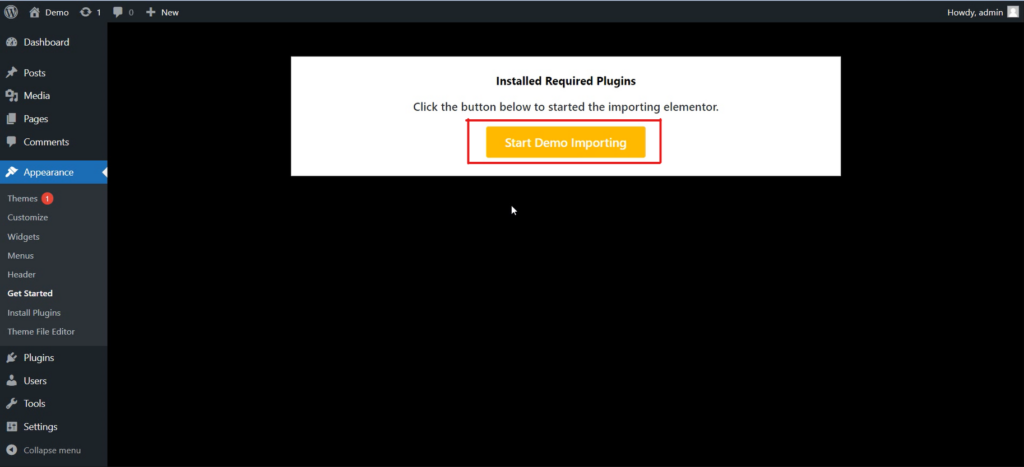
Once you’ve purchased the LMS theme for WordPress by WP Elemento and installed WordPress on your hosting server, the next critical step in creating your online coaching website is setting up the theme and importing the demo content.
To begin, activate the LMS theme you’ve installed. Upon activation, you’ll need to follow the theme’s documentation carefully to import the demo content. This step is instrumental in getting your website up and running efficiently.
Importing the demo content essentially replicates the design and structure showcased in the theme’s demo version on your website. It’s a time-saving process that instantly populates your site with sample data, including text, images, and layouts.
Moreover, when you import the demo content, it also includes the installation of essential plugins like Elementor and Tutor LMS. Elementor empowers you with a drag-and-drop page builder to design your web pages visually, while Tutor LMS provides the foundation for creating and managing your coaching courses effectively.
This pre-populated content serves as a helpful starting point that you can easily customize to suit your specific coaching needs. You can replace the sample data with your own content, such as course descriptions, images, and videos, ensuring that your website is tailored to your unique coaching brand and style.
Step 6: Setup Homepage And Blog Page
The next crucial steps in building your online coaching website involve setting up the homepage and designating a blog page. These elements play a pivotal role in creating an engaging and organized online presence for your coaching services.
Firstly, your website’s homepage is essentially your digital storefront. It’s the first impression visitors get of your coaching brand, so it needs to be visually appealing and informative. With the LMS WordPress Theme by WP Elemento, you can use the built-in customization tools, such as Elementor, to craft a homepage that reflects your coaching style. You can showcase key information, such as your coaching approach, services, testimonials, and compelling visuals, to captivate your audience.
Secondly, a blog page is valuable for sharing educational content, updates, and insights with your audience. It’s a platform for establishing your expertise and building trust. To set this up, navigate to the WordPress settings and choose “Reading.” Here, you can designate a specific page as your blog page, ensuring that your coaching website includes a dedicated space for valuable articles, guides, and news related to your niche. This not only keeps your audience engaged but also enhances your website’s SEO, making it more discoverable by potential clients or students.
Step 7: Setup Tutor LMS
The next crucial step in creating an online coaching website is setting up Tutor LMS, a powerful Learning Management System plugin designed to facilitate course creation and management. Tutor LMS is the backbone of your coaching platform, allowing you to offer and deliver your courses effectively to your audience.
To kickstart your online coaching journey with Tutor LMS, begin by organizing your course content. You can categorize your courses by adding relevant categories through the Tutor LMS dashboard. This helps in structuring your courses logically and making it easier for users to browse and find the courses that interest them.
Once you’ve established your course categories, it’s time to create individual courses. Access the Tutor LMS dashboard and select “Courses.” Here, you can easily add new courses, providing detailed information about each one. Replace any demo content with your own course materials, including course descriptions, curriculum, and media such as videos or downloadable resources.
For each course, you can set prerequisites, duration, difficulty levels, and pricing options if you’re selling your courses. Tutor LMS also offers the flexibility to enable or disable course reviews, quizzes, and assignments, tailoring each course to your specific coaching needs.
It’s important to ensure that your course content is engaging and informative, as this will play a pivotal role in attracting and retaining your students. Include well-structured modules, informative videos or presentations, and interactive quizzes or assessments to enhance the learning experience.
Additionally, Tutor LMS offers various features like certificates, quizzes, and drip content, allowing you to provide a comprehensive and enriching educational experience to your coaching clients or students.
By setting up Tutor LMS and customizing your courses with your own materials, descriptions, and media, you’re not only creating a professional and effective online coaching platform but also ensuring that your content aligns with your coaching goals and expertise. This step brings your coaching website one step closer to offering a valuable and engaging learning experience to your audience.
Step 8: Configure Tutor LMS Plugin Settings
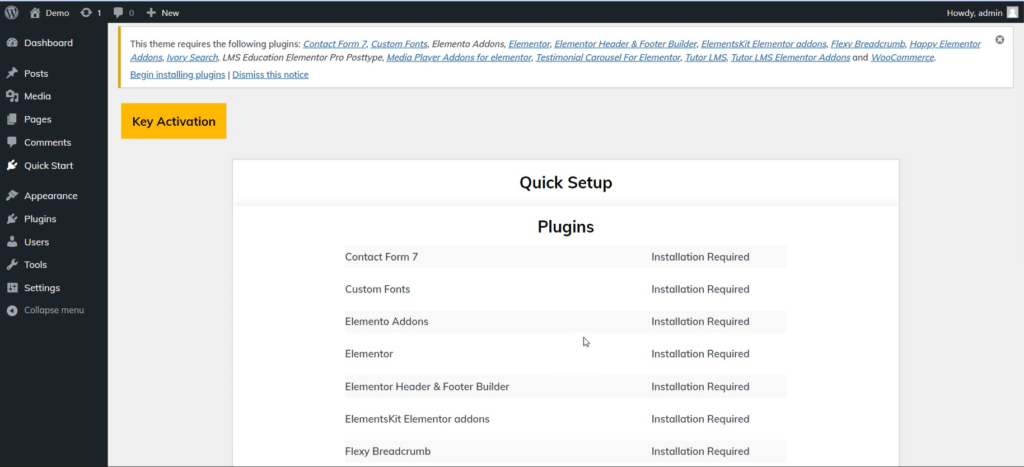
Configuring the Tutor LMS plugin settings is a critical step in creating your online coaching website. This process involves customizing the plugin to align with your specific coaching website’s requirements, ensuring that it functions seamlessly and efficiently.
One of the key aspects you can tailor to your needs is the option to enable the marketplace. Enabling the marketplace allows you to create a platform where multiple instructors can offer their courses. This feature is especially valuable if you plan to collaborate with other coaches or educators. You can set up revenue-sharing agreements and create a thriving ecosystem of educational content.
Course enrollment settings are another vital component to configure. You can define how learners can enroll in your courses, whether through free registration or paid enrollment. Implementing flexible enrollment options is crucial to accommodate a wide range of learners and pricing strategies.
Monetization options are also worth your attention. The Tutor LMS plugin allows you to set pricing for your courses, and you can choose between one-time payments, subscriptions, or a combination of both. You can also configure payment gateways to accept payments securely. This versatility enables you to create various revenue streams from your coaching website.
Additionally, you can fine-tune settings related to certificates and badges, which can be awarded to students upon course completion. These certificates can add value to your courses and motivate students to complete their training.
Furthermore, you can configure course prerequisites, ensuring that students have the necessary background or have completed specific courses before enrolling in advanced content. This feature enhances the overall learning experience and helps students progress at their own pace.
Step 9: Customization If Needed
Now, it’s time to tailor your coaching website’s design to align with your brand and style. Customization is a crucial step in ensuring that your website stands out and effectively communicates your coaching offerings to your target audience.
The theme comes equipped with Elementor, a powerful and user-friendly page builder that empowers you to make extensive design modifications without the need for coding knowledge. With Elementor, you have the freedom to customize your site’s appearance, layout, and content elements to create a unique and visually appealing online coaching platform.
You can easily change fonts, colors, and background images to match your brand’s identity. Additionally, Elementor offers a vast library of widgets and pre-designed templates that you can drag and drop onto your pages, allowing you to create engaging course pages, about-sections, contact forms, and more.
Moreover, you can rearrange sections, add animations, and fine-tune the mobile responsiveness of your site to ensure it looks great on all devices. This customization process enables you to create a cohesive and professional online presence that resonates with your coaching niche and appeals to your target audience.
Step 10: Launch Your Website
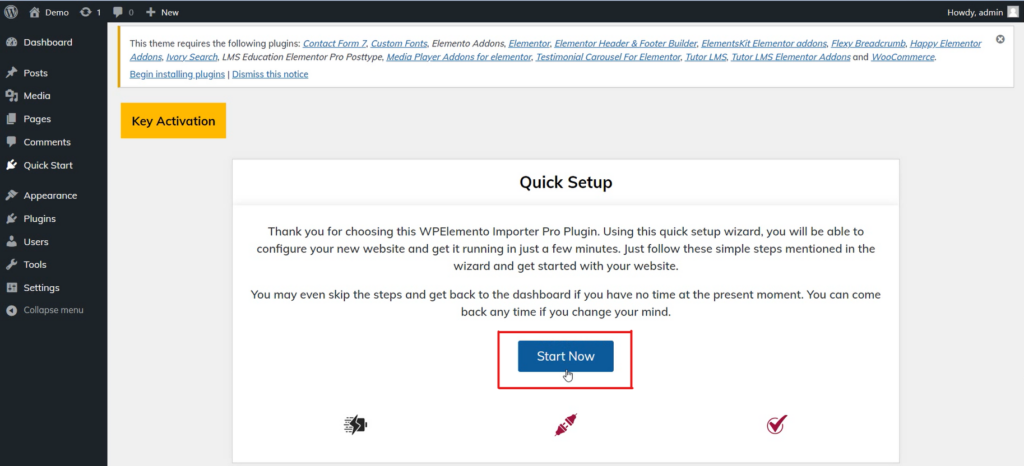
After thorough testing and customization, you’re ready to launch your online coaching website. This crucial step marks the moment when your website becomes accessible to your target audience. Before launching, it’s essential to perform a final quality check to ensure a smooth and error-free user experience.
Firstly, review all links on your website to verify that they are correctly linked to their respective pages or resources. Visitors who encounter broken links can become frustrated and lose trust in your website.
Secondly, test all forms on your site, such as contact forms, registration forms, and subscription forms, to ensure they function correctly. Test submissions to confirm that they reach the intended recipients and that email notifications work as expected.
Lastly, if you plan to offer paid courses or coaching services, meticulously test your payment gateways. Verify that payment processing is secure, that customers receive confirmation of their transactions, and that they gain immediate access to the content they’ve paid for.
Once you’ve verified that all elements of your website are in working order, it’s time to officially launch your online coaching website. Announce your website’s launch through your marketing channels, social media, and email newsletters to begin attracting your target audience. With a well-prepared and thoroughly tested website, you’re set to embark on your online coaching journey and connect with clients and students worldwide.
Step 11: Start Marketing
After the technical setup and customization of your online coaching website with the LMS WordPress Theme, it’s time to embark on the crucial journey of marketing. Effectively promoting your coaching services and courses is key to attracting your target audience and building a successful online coaching business.
One of the primary channels for marketing your coaching website is through social media platforms. Utilize networks like Facebook, Instagram, Twitter, and LinkedIn to connect with potential clients and students. Share valuable content, including articles, videos, and success stories, that showcase your expertise and highlight the benefits of your coaching.
Another powerful tool you can use is email marketing. Build an email list by encouraging website visitors to subscribe to your newsletter. Send regular updates, informative newsletters, and exclusive offers to keep your audience engaged and informed about your coaching services and upcoming courses.
Additionally, invest in Search Engine Optimization (SEO) to improve your website’s visibility on search engines like Google. Optimize your content with relevant keywords, meta tags, and quality backlinks to rank higher in search results.
Engage actively with your target audience through social media interactions, email responses, and community building. Answer inquiries promptly and provide personalized guidance to potential clients and students.
By promoting your coaching services and courses through these diverse marketing channels and engaging with your audience, you’ll create a strong online presence and attract individuals who are genuinely interested in your coaching expertise. This proactive approach will drive traffic to your website and increase your chances of success in the competitive world of online coaching.
Conclusion
In closing, our journey to create a powerful online coaching website with the LMS WordPress Theme by WP Elemento has been an enlightening one. We began by understanding why coaching necessitates an LMS website, recognizing its pivotal role in modern coaching. WP Elemento offers many more such Elementor WordPress themes
Delving deeper, we explored the remarkable features that this theme brings to the table, including its Elementor integration, Tutor LMS optimization, responsive design, mega menu, and one-click demo importer. These features provide the building blocks for a professional, engaging, and effective coaching platform.
Our step-by-step guide then walked you through the entire process, from securing a domain and hosting to launching your website. You learned how to set up Tutor LMS, customize your website, and market your coaching services effectively.
With these insights and actions, you’re now equipped to embark on your journey of creating a dynamic online coaching presence. As you venture forward, remember that your coaching website is not just a platform but a bridge to connect with your audience, share your expertise, and inspire transformation in the lives of your clients and students. Embrace this opportunity with enthusiasm, and may your online coaching journey be a rewarding and successful one. Also you can find more such themes and shop them according to your taste, and if you want to save some bucks you can get our WordPress Theme Bundle, where you can get a pack of 32+ themes just at $79.
FAQs
Here are some frequently asked questions you might have:
Q1. What is an LMS WordPress Theme, and why is it important for creating an online coaching website?
As we have discussed earlier, an LMS WordPress Theme is a specialized theme designed for creating websites that offer online courses, coaching, and educational content. It’s crucial for coaches as it provides essential features and functionalities tailored to the needs of online coaching, making course creation and management much more efficient.
Q2. Do I need technical expertise to use the LMS WordPress Theme by WP Elemento?
No, you don’t. The theme is user-friendly and built with beginners in mind. You can easily customize and manage your coaching website with its intuitive interface.
Q3. What are the key features of the LMS WordPress Theme by WP Elemento that make it suitable for online coaching?
Key features include Elementor integration for easy customization, optimization for Tutor LMS for course management, responsive design, mega menu for navigation, and a one-click demo importer for quick setup.
Q4. How do I start offering courses using the Tutor LMS plugin with this theme?
You can start offering courses by adding categories and creating individual courses through the Tutor LMS dashboard. Replace demo content with your course materials, descriptions, and media.
Q5. Can I customize the theme to match my coaching brand and style?
Yes, the theme allows for extensive customization using Elementor. You can personalize the design, layout, and color schemes to align with your coaching brand.
Q6. Is SEO included in the theme?
SEO features are not directly included in the theme, but you can optimize your content for search engines using WordPress SEO plugins and best practices.
Q7. How can I build and grow my email list for marketing purposes?
You can build your email list by encouraging website visitors to subscribe to your newsletter. To attract subscribers, provide valuable content and incentives.
Q8. What are some effective marketing channels for promoting my coaching services and courses?
Effective marketing channels include social media platforms, email marketing, and search engine optimization (SEO). Engaging with your audience on these channels is key.
Q9. Can I offer live coaching sessions through my website using this theme?
Yes, you can offer live coaching sessions by integrating video conferencing tools or scheduling appointments with clients or students.
Q10. How long does it take to create an online coaching website using the LMS WordPress Theme by WP Elemento?
The time required depends on your familiarity with WordPress and the theme. With our step-by-step guide, you can create a basic website in a day, but customization and content creation may take longer, depending on your goals and requirements.




